Andrew Jefford once announced at a European blogger’s conference that the wine writer is dead. We weren’t aware that he had been ill, but as the last typewriter rolled off the typing press last week we can truly concur that the wine column has finally crumbled into irrelevance. Once upon a time Michael Broadbent carved his opinions on tablets of stone, Evelyn Waugh wrote elegant vinous vignettes and dinosaurs stalked the earth, but now all you need is a blog page, a Facebook account and an itchy tweeting finger and son, you will be a consummate all-around communicator. That’s irony. I’m being ironic, innit?
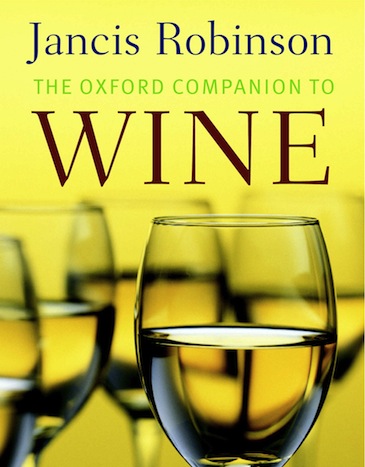
Wine Writing is defined by the Oxford Companion to Wine as a parasitical activity enabled by vine growing and wine making but more usually associated with wine tasting, and even wine drinking, than any of the former. There is a plethora of wine writing out there, a white noise of opinions. We are all now self-appointed critics. With five oceans of wines to review and pass judgement on, with more opinions to react to and more issues to vent about, can we distinguish the words from the trees?
Some writers, whether or not you subscribe to their views, are entertaining and readable; others are studiously informative; a very few get to the heart of the matter. Dr Johnson said that the two most engaging powers of an author are to make new things familiar and familiar things new. The best writers on the subject of wine seem to be able to write in a style that combines clarity with wit, and appear personally engaged with the topic. Their writing always feels fresh rather than mere filler for a page in a newspaper or magazine.
Of course, it doesn’t help that the utilitarian way wine is taught, directs us to limit our imaginations (and thus our vocabulary) to focus so literally on the liquid qua liquid in the glass instead of the catalytic properties of that liquid. Rather than being the spur to further discourse, wine writing has become a quasi-professional end in itself, and thus is rarely adventurous, controversial, intellectually provocative or emotionally engaging.
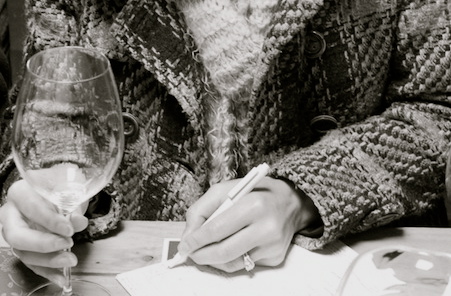
As there are so many people giving their tuppence hap’orth about wine in so many different media it has become easy to identify stylised approaches to wine writing. Here are some of my favourites:
“The Gusher”…
… is one who enjoys wine for GOODNESS sake and whose every testosterone-soaked pronouncement has full screamers attached. The gusher inhabits the mythical sunlit uplands of the wine world where everything is for the best in the best of all possible worlds. His (usually his) oeuvres read like an advertorials chinking glasses with fulsome hyperbole.
Superlatives are the only currency that this writer recognises. “The reason why many people are so fond of using superlatives, is, they are so positive that the poor positive is not half positive enough for them” (Augustus William Hare & Julius Charles Hare, Guesses at Truth). Hence we read that so-and-so is the best winemaker on earth. Planet earth, that is, the Vigneron-Titan in question bestriding his vineyards, possessed of irresistible winemaking genius. Perfection is not just sought in winemaking, it is regularly attained, and by asserting that something is, without doubt, the greatest, you may claim some of that vicarious greatness for yourself. It is a fact universally acknowledged that people who drink great wines (with great scores) become just a little bit more awesome.
The gusher knows that metaphors are like similes and is not afraid to use them to distraction and destruction. Thus the wine can be “a tiger” or any other cool cat, a sports car, or a piece of heaven itself. Because the latent appeal of a wine may only be conveyed in shouty blokish platitudes that readers of popular magazines can relate to.
The gusher is also inordinately fond of making lists and will frequently give their top 50 or top 100, in order that we may witness the spectacle of perpetual pluperfect climax.
“The Stitcher”…
… is hostage to the vagaries of the commissioning editor, and his/her compositions are often butchered by another’s ragged editorial garden shears. The resultant wine articles morph into a succession of simplistic, semi-digested sound bites. Most trade magazine pieces have more than a whiff of the cut-and-paste of hacked-up quotations, with context sacrificed on the altar of word count. Once you adapt your writing to this dumbed-down format your style is compromised. The stitcher will lapse into clichés at the drop of a hat (sic) and tend to adopt a tone of breathless “newspeak” –Bill Koch, for example, is always “billionaire Bill Koch” (he should change his name by deed poll). So much reporting is in reality lazy news fodder.
“The Olympian”
Immortal reputation assured, the Olympian writes about wine with an academic bent and conveys opinions with a kind of venerable detachment. This grandest of grandees never gets involved in the down-and-dirty blog fist-fests but twitches an amused aristocratic eyebrow at the sublunary shenanigans of lesser writers. The Olympians rarely deign to give praise nor they convey emotion lightly; they are grave divines and their writing might be termed “an elegant sufficiency.” One might imagine their words being carved into tablets of polished black basalt, mounted in the British Museum, etched deep so that even the partially sighted can feel their way to their eternal wisdom.
“The Stylist” …
… would like their utterances to be treated with the same oracular regard as The Olympian. Will occasionally adopt a persona or avatar to ventriloquise their utterances. The stylist tends to culture his/her writing with verdant allusion (to the point of archness), fine-tuning each sentence so that it resonates maximally. Writing with beautiful whimsy, the stylist occasionally lacks substantive ideas to underpin his liquid prose.
“The Encyclopaedia”
The other kind of wannabe Olympian is the puffer (see below) who organises every opinion and every mark into one vast web site repository of information in order to construct a monumental Casaubon-like key to all wine mythologies. The modern term for this is “a resource”.
“The Puffer”
Writes about all aspects of wine with indecent haste in order to fulfil manifold writing engagements. Recognised for assiduousness and a thoroughly workmanlike approach the puffer will have about half a dozen blogs on the go and be constantly updating his or her wine status on social media. It is the Gradgrind “Facts, facts, facts” approach to wine, accumulating information almost without discrimination. The puffer is less a writer than a data pack.
“The Techno-Blogger”
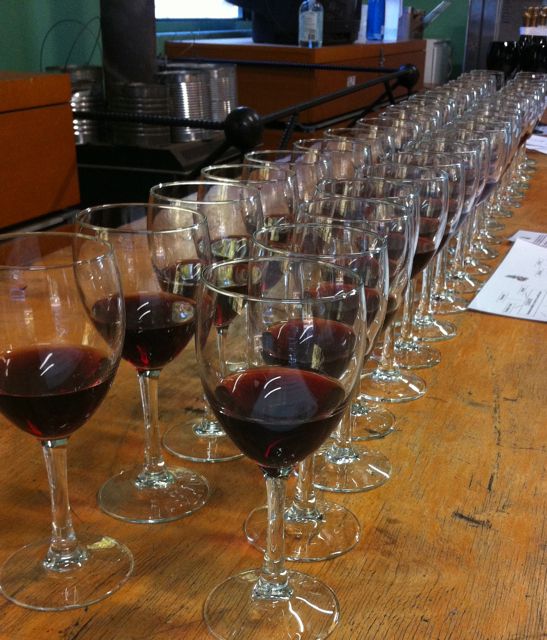
The techno-blogger is the specialist’s specialist inhabiting the narrow realm of winemakers and nerds who communicate in a strange form of binary language. It’s the sort of stuff you read and nod sagely without knowing why you’re reading it and nodding sagely. Techno-blog writing, uncoupled from flair and passion, is apt to strip every last atom of joy from the subject of wine, condensing the entire wine to a fine microbiological discipline of terminological exactitudes. The techno-blogger believes in the ineffable power of scientific fact the way an ancient tribe might believe in the power of voodoo, but these facts end up as ornamental lamp-posts, something to hold on to, rather than to shed real illumination on the subject matter.
Apropos of this I am often asked to provide technical notes for wines as if they provide an armour against ignorance. Well, I prefer amour to armour. It’s all very well to know the exact temperature of the fermentation, the ratio of stems used, the origin of the oak barrels and so forth – in the end the best wines are always more than the sum of their technical parts. Plus too much information is apt to desensitize one’s response to wine. When I see professionals tasting like automatons, churning through dozens of wines at a swift lick, I know that they are merely brushing against the outer frame of the wine and their writings will reflect that. Drink deep (if you can) or taste not the Pierian Spring. Wine may be the result of process but the story is not exclusively about process – there is a human dimension to making the wine, drinking the wine and reacting to the wine.
“The Professional Contrarian”
Talks loudly and carries a big shtick. The skilful contrarians combine waspish wit with difficult-to-refute logic, the majority, however, tend to end up bombinating in a vacuum. The favourite expression of the contrarian is to describe anything they are suspicious about as “the emperor’s new clothes”, implying that they are the clear-sighted little boy fearlessly articulating the truth whilst all others are slavishly worshipping the trend. In fact, this faux-controversial stance disguises a reactionary sensibility and a crabbed fogeyism.
Finally, the contrarian loves to construct rickety straw man arguments in order to have a public argle-bargle with a highly theoretical adversary who sometimes only exists in his mind.
“The Natural “
When we see a natural style we are quite amazed and delighted, because we expected to see an author and find a man ~ Blaise Pascal, Pensées 1670
A rare bird, this wine writer who puts him or herself into the writing. Professes real enjoyment about wines rather than the histrionic effusions of the gusher. Writes with easy certainty yet becoming humility, feels the wines and the subject matter itself to be fresh and exciting and forever revealing new truths. And what is more natural than to show excitement about the subject that you are passionate about?
The Future of Wine Writing
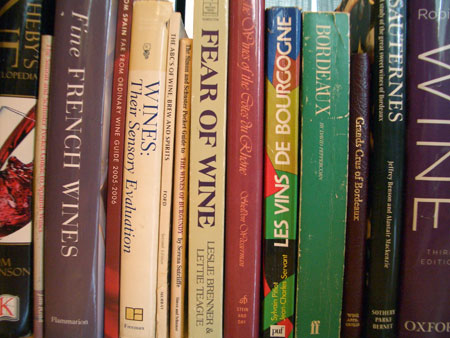
What Andrew Jefford was presumably referring to was the fact that it is nigh impossible to find a publisher for a wine book in this country. Or rephrase that to “intelligent wine book”, as despite the fact that millions of people drink wine regularly, the subject is still regarded by publishers as a functional minority interest and consequently off-limits. With a dearth of captivating writing because so few who will think, drink and write outside the box, wine should surely be better served by its non-publishers and would-be writers. The blog is virtually the only healthy forum to explore wide-ranging and personal responses to wine.
*Read more about wine writing in our “Language and wine” post HERE.
Here are a few highlights:
“If we can simplify the terminology without oversimplifying the nature of the wine, using words that people can relate to, then we can make wine more accessible yet more interesting at the same time.”
“Words are rough tools no matter how they are combined and with what kind of authority they resonate. Traditional wine descriptors such as “elegant,” “refined”, “varietally-correct” and so forth, cast an obscure patrician shadow over a past-time (i.e. drinking) that is essentially hedonic in nature. Language is made to fit over experience like a straitjacket. High-concept terms embodying classical notions of balance and proportionality, implying that every wine should conform to particular architectural precepts, create a remote hierarchy and places man or man’s system before the wine – as if the whole notion of taste was merely part of some Platonic classification.”
“Wine has not been served well by the written word either; the lengthier wine columns in national newspapers have all but been pruned to nought by editors who are unable see the relevance of wine as a cultural phenomenon. Restaurant reviewers ignore the very existence of wine as a fundamental part of their meal yet lavish detailed descriptions of every dish they taste. This sin of omission stems from an inability to talk familiarly about wine, as if its language was some kind of obscure dialect known to a chosen few.”
“When I write tasting notes carelessly I might as well be filling it tax forms or ticking boxes. My writing denatures the wine and dissipates the romance.”
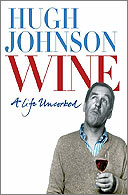
Our favourite writers include the following – some write with fearless punkish (and puckish) élan, some with an inquisitive mind and an admirable thoroughness of purpose, some with humour and some with craggy authority, some make you reflect (whether you agree with every word) and others make you want to pick up your pen/laptop and write something yourself.


Nice one Doug. Seemingly editors and TV producers/directors think that talking about wine is elitist while encouraging chefs to promote “the most expensive chicken one can buy”
Thought provoking but enjoyable too.
An excellent summary of the comi-tragic status of today’s wine writer. I have been busy in this particular world for some 40 years, but pity any who fancy making a living as I did! Your dissection of the various sub-categories of writer is very amusing and accurate.
Thank you all for your comments. I think one of the problems of writing is keeping it fresh. The demands of social media entail that we are always writing even if we don’t have anything new to say. The best writers are the ones who use wine as the starting point of a journey and use a mixture of wit, knowledge, thoughtfulness and warmth to guide us to an interesting destination. When writing for newspapers and trade mags one is editorially constrained and having to default to specific audience expectations, conversely bloggers may be self-indulgent to a fault. The wine writer who can liberate him/herself from these is the most adept communicator, combining knowledge, passion and imagination in an eminently readable style.